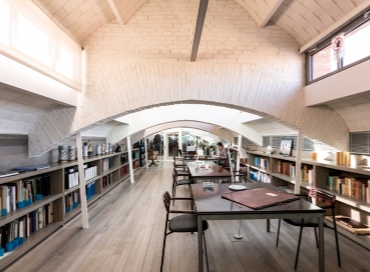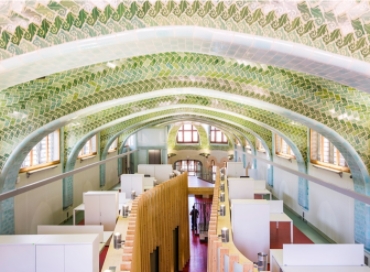-
Community Relations Plan
Since it was built, the Sant Pau monumental site has been a space associated with the neighbourhoods around it: Sagrada Família, Baix Guinardó, Guinardó and Camp de l’Arpa. To strengthen the bonds created over the decades with the surrounding area, the Foundation promotes various initiatives to consolidate the Sant Pau Art Nouveau Site as a vehicle for information and a meeting point with the city:
SEE MORE SEE LESSSince it was built, the Sant Pau monumental site has been a space associated with the neighbourhoods around it: Sagrada Família, Baix Guinardó, Guinardó and Camp de l’Arpa. To strengthen the bonds created over the decades with the surrounding area, the Foundation promotes various initiatives to consolidate the Sant Pau Art Nouveau Site as a vehicle for information and a meeting point with the city:
- Friends of the Art Nouveau Site. Fidelity programme that offers of advantages, including free access for local residents.
- Open Doors Days. On the first Sunday of every month we offer free entrance for people over 65 years old. On Sant Jordi’s day, La Mercè and Museums Night, the public spaces can be visited, free of charge for all who register in advance to participate. Special cultural activities are programmed on these days.
- Collaboration with the local associations. The Art Nouveau Site works together with neighbourhood associations and other local organisations to increase knowledge about the heritage space and its role within the city.
- Schools. As part of the Foundation’s visitors programme, local schools are invited to participate in a diverse offering of educational activities The Art Nouveau Site is also involved in the Jaume Bofill Foundation’s Magnet Programme in partnership with Mas Casanovas School (Baix Guinardó). The goal is to make Sant Pau the main driver of the school’s teaching innovation project.
- Social services and third sector organisations. Social centres and organisations that work to promote human rights and to provide support for vulnerable collectives can visit Sant Pau free of charge, on upon prior request.
-
Support for children and young people at risk of social exclusion
The private foundation is aware of Sant Pau’s social and educational value as a masterpiece of Catalan Art Nouveau architecture heritage. It therefore guarantees free access (self-guided visits) to organisations in the third sector and schools that work with minors and young people at risk of social exclusion.
SEE MORE SEE LESSThis line of work is basically organised by a collaboration agreement with the Federation of Childhood and Adolescent Care Organisations (FEDAIA), which works with over 100,000 children and 35,000 families. The agreement also provides access for families who foster minors participating in some of the Federation’s programmes. Furthermore, in the framework of the Free Offer Programme of the Barcelona Municipal Education Institute, the Art Nouveau Site provides 330 places a year in guided visits to schools whose students are in vulnerable situations.
-
Collaboration with social projects
The social programme also includes various collaborations that the Art Nouveau Site has with organisations whose principal beneficiaries are vulnerable individuals and collectives, or that work towards social cohesion and human rights.
SEE MORE SEE LESSThe interventions include loaning spaces for activities and providing access to the heritage site for various collectives that require specific attention.
-
Responsible tourism
Sant Pau is an affiliate member of the World Tourism Organisation and promotes a quality, inclusive, non-mass tourism model that is reflects the Foundation’s commitment to its surroundings and the need to ensure that visits are compatible with the different uses of the heritage complex.
SEE MORE SEE LESSSant Pau is an affiliate member of the World Tourism Organisation and promotes a quality, inclusive, non-mass tourism model that is reflects the Foundation’s commitment to its surroundings and the need to ensure that visits are compatible with the different uses of the heritage complex.
This commitment has been acknowledged with the Biosphere Certificate, awarded by the Responsible Tourism Institute (RTI), which certifies the exercise of responsible, environmentally sustainable, socially inclusive and accessible activity. Consult Sant Pau’s Responsible tourism policy.
-
Sustainable buildings and environments
The efforts made during rehabilitation works mean that the historic art nouveau buildings are energetically and functionally sustainable today.
SEE MORE SEE LESSThe efforts made during rehabilitation works mean that the historic art nouveau buildings are energetically and functionally sustainable today. Among other measures, the Art Nouveau Site has the largest geothermal installation in southern Europe, a clean technology that makes it possible to efficiently heat and cool spaces while achieving significant energy savings. As a result of this intervention, together with the quality of rehabilitation works and other initiatives designed to promote savings in energy and water consumption, the Sant Pau monumental complex is the only UNESCO World Heritage Site that has been awarded six LEED certifications (Leadership in Energy and Environmental Design) awarded by the US Green Building Council. Two art nouveau pavilions have been awarded LEED GOLD, and three have been certified as LEED SILVER. At the same time, the heritage site has been receivred the LEED Neighbourhood Development certification in recognition of the Art Nouveau Site’s contribution to the social cohesion and sustainability of adjacent neighbourhoods. More information
-
Environment and energy management
The Foundation’s strong commitment to social and environmental responsibility has shaped both the rehabilitation works and current site management.
SEE MORE SEE LESSThe Foundation’s strong commitment to social and environmental responsibility has shaped both the rehabilitation works and current site management. The Art Nouveau Site’s Environment and Energy Policy establishes the vision and values that have guided the definition and implementation of the Art Nouveau Site’s Environment and Energy Management System. Developed in accordance with ISO 14.001 and 50.001 criteria, the system is audited periodically with the goal of ensuring continuous improvement in relation to energy consumption, waste, water, biodiversity, purchase criteria, and communications, among other activities relevant to the site’s sustainability. As a result of these efforts, energy consumption has dropped by more than 30%, new bins facilitate the segregation of waste, remote work systems contribute to the reduction of commuting-related impacts, and the digitization of communication materials has helped to avoid waste and paper consumption. Two pilot projects aiming to reduce the demand for irrigation water and promote biodiversity in gardens and outdoor spaces are also being developed. The focus on continuous improvement means that efforts will be made to further reduce consumption, promote responsible purchasing, and develop a service for calculating the CO2 footprint of events held on site.
The Foundation is also sharing a collection of good practices with staff, site visitors, office occupants, as well as external collaborators. You can send your proposals, requests and recommendations to: sostenibilitat@fundaciosantpau.cat

-
United Nations Global Compact
The Art Nouveau Site, as part of the Fundació Privada Hospital de la Santa Creu i Sant Pau, is a signatory of the United Nations Global Compact, the world’s biggest corporate social responsibility initiative
SEE MORE SEE LESSThe aim is to promote the implementation of the 10 universal principles in business activity in the fields of human rights, labour, environment and anti-corruption in the activities and strategies carried out. The Communication of Engagement periodically communicates actions carried out to implement the provisions of the Global Compact.
You want to know more?
-

Become a friend
The Program Friends of Art Nuveau allows residents of the Sagrada Família, Guinardó, Baix Guinardó and Camp de l’Arpa neighborhoods to access Sant Pau for free throughout the year, among other benefits. + INFO -

Contact
Sant Pau is currently a unique work environment available to companies and institutions. If you want to know more details about the characteristics of the spaces that the Recinte Modernista can offer to your project or organization. + INFO -

Social and environmental programme
The educational program includes, in addition to the free and guided visit, three activities aimed at primary, secondary and high school cycles for delve into specific aspects of the old Sant Pau Hospital. + INFO -

Who are we?
Sant Pau hosts a series of leading institutions in the fields of sustainability, health and education, among others. These organizations develop their own programs and projects in the Modernista Precinct, and also undertake joint initiatives with the aim of providing answers to the challenges of society in the 20th century. + INFO -

Services
+ INFO -

Resident organizations
The old modernist buildings are today modern and functional work spaces. + INFO







 Tickets
Tickets


